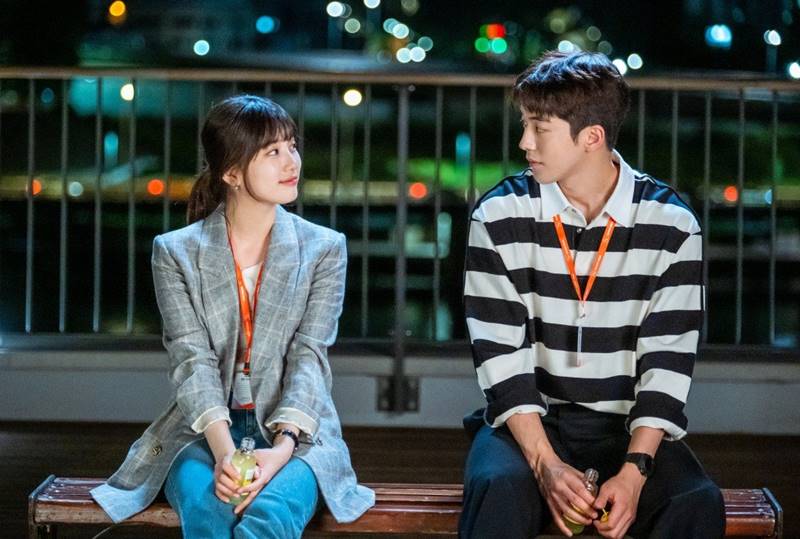
By Jae-Ha Kim
jaehakim.com
December 21, 2020
☆☆☆☆
Seo Dal-Mi (played by Bae Suzy)
Nam Do-San (played by Nam Joo-Hyuk)
Han Ji-Pyeong (played by Kim Seon-Ho)
↑Note: Korean names denote the surname followed by the given name.
I selected “Start-Up” as one of my favorite K-dramas of 2020 for Teen Vogue and I’m just now publishing my review, because … I didn’t want to compete with myself, after all.
After their parents divorce, Dal-Mi (played by Bae Suzy) stays with their idealistic father, while her older sister, In-Jae (portrayed by Kang Han-Na), moves to the U.S. with their mother and rich stepdad. The siblings reunite in their 20’s. In-Jae is now an accomplished businesswoman backed by her stepfather’s wealth. Dal-Mi has a lot of ideas, but no money to follow through. She colors her raggedy shoes with black marker to give them the appearance of being new.
The sisters will end up competing against each other to launch their own tech start-up companies. And eventually, they will come to a better understanding of what each went through after their family splintered.
As I said in my Teen Vogue piece, moreso than any series in recent memory, this K-drama has a second male lead (Kim Seon-ho) who is so charismatic that his storyline often overshadows that of the very handsome lead (Nam Joo-hyuk). Ultimately, as Dal-Mi’s fractured family comes together, “Start-Up” reinforces the idea that no matter how broken a family is, the ties remain – for better or worse.
Kim Joo-Hun is sympathetic as the girls’ father. He portrays an office worker whose ideas are easily dismissed at work. He eventually quits his job to realize his dream of being his own boss. This move costs him his wife. Early on, the girls’ mother is presented as confrontational and money hungry. But when you view their life realistically, someone had to earn money to support the family. She didn’t work outside the home. And re-entering the job market as a middle-aged woman who has been out of the work force for a decade would be nearly impossible in today’s South Korea. (See “Romance is a Bonus Book” for more on that.)
The second male lead, Ji-Pyeong (portrayed as a child by Nam Da-Reum), comes with a heartbreaking storyline. While still a high school student, he aged out of the orphanage he lived in. They sent him off with about $1,700. Though that may sound like a lot of money, it won’t cover more than rent and some food for a month or two.
Smart and industrious, he is stunted by the laws. His age prevents him from signing legal documents or even opening up a bank account by himself. When he meets Dal-Mi’s grandmother (beautifully portrayed by Kim Hae-Sook), she feeds him and gives him a place to sleep. And, eventually, she asks him to befriend Dal-Mi — not in real life, but as a penpal. Not wanting to use his own name, Ji-Pyeong picks the name Do-San after seeing a photo of the real-life Do-San and his parents in the newspaper after he won a math competition.
Years later, Dal-Mi wants to find Do-San. Can you guess what happens next? Of course you can.
There is so much unnecessary drama about Do-San pretending he was Dal-Mi’s penpal, and Ji-Pyeong not wanting to tell the truth, and Dal-Mi’s grandmother wanting to reveal all and simultaneously remaining quiet. Why? Because no one wants to hurt Dal-Mi.
I kind of felt like these are the same type of people who keep the Santa Claus myth going for years beyond what’s healthy. They should’ve ripped all the lies off like a bandage early on and told her the truth.
But with all that said, this series was also delightful in so many ways, especially when it dealt less with the love triangle and more on the familial relationships.
Airdates: Sixteen hour-long episodes aired on tvN from October 17 to December 6, 2020.
Spoiler Alert:
As much as I was rooting for the second lead, the fact is that he didn’t do much to help his cause. When Do-San moved to San Francisco for three years to work for a tech company, Ji-Pyeong didn’t reveal his feelings to Dal-Mi. He didn’t give her the chance to fall in love with him. I get unrequited love. But a person can’t expect someone to fall into their arms if they don’t reveal their own feelings. And, if per chance he did — but that wasn’t depicted in the series — then there’s his answer. She’s not interested in him. And that has nothing to do with her feelings for Do-San, but her lack of romantic feelings for him.
I would’ve loved to have seen more of a storyline between Dal-Mi and her father, before he died. He was a dreamer, who lacked the funding to realize his genius early on. In some ways, he reminded me of my father, who had so many ideas (and even patented some of them), but didn’t live long enough to see them into fruition. This is Kim Joo-Hun’s fourth K-drama of 2020 (“Dr. Romantic 2,” “It’s Okay to Not Be Okay,” “Do Do Sol Sol La La Sol“) and he was wonderful as the dad.
I loved how (the child version of) Dal-Mi found simple pleasures in life, like requesting that her dad bring home fried chicken on payday. It broke my heart when In-Jae said she was sick of having to pretend to be grateful for such basic treats, because it reminded me of how others may have thought it was silly of me to get excited over…chicken. I used to be so happy when my mom brought home Kentucky Fried Chicken or Chinese carryout on her way home from work. To me, that is a fond memory I still have. As an adult, I appreciate even more how my parents spent their hard-earned money so that we didn’t feel we were missing out on things that were normal for so many of our school friends.
© 2020 JAE-HA KIM | All Rights Reserved






Switching male lead makes mix emotions though